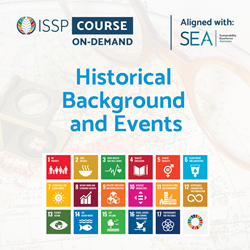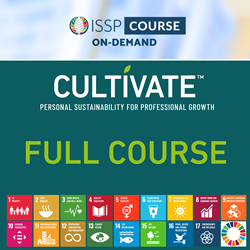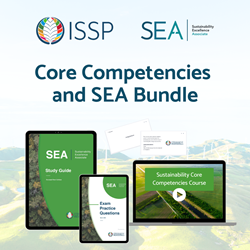Historical Background and Events Course
On-Demand Courses
This module provides a history of the sustainability field and commonly used language to help others understand what sustainability means and to advance the most effective sustainability practices. In addition, students will learn the history of how society’s practices became unsustainable and the movement to change that trajectory.
The content of this video is based on Chapter 6 of the SEA Study Guide and can be used as preparation for the SEA exam. This course is a tool to help you study for the exam, but completion of the Sustainability Core Competencies course does not guarantee passing the SEA exam. [Read disclaimer.]
Access for this course will be available for 1 year from date of purchase.
This course module is presented in five sections, approximately one hour:
- 6.1 Introduction - Form an outline for the 40 year history of sustainability and learn how society became unsustainable through mechanized human- and animal-powered labor.
- 6.2 Industrial Revolution - Learn about the rise of the Industrial Age and how an unsustainable cycle began that depended on cheap labor, dependence on fossil fuels, and constant demand for mass-produced goods.
- 6.3 The Birth of Environmentalism - Explore the origins of the modern environmental movement, the emergence of NGO-led environmental initiatives, environmentalism’s link to the Atomic Age, and responses to the extractive economy.
- 6.4.1 Toward Sustainable Development, Part 1 - Learn about the founding of the United Nations, how the UN created the concept of sustainable development, and about future committees formed at the Rio Earth Summit.
- 6.4.2 Toward Sustainable Development, Part 2 - Learn about the Montreal Protocol, the Millennium Development Goals, the 2030 Agenda and the Sustainable Development Goals, and the Paris Agreement.
- 6.5 Conclusion - Review the key points of module 6 and learn about the progress towards the goals set forth in previous agreements.
Course participants will take one quiz at the end of this module, approximately 10 questions.
Following the successful completion of the course, students will receive a Certificate of Completion, indicating knowledge of core sustainability concepts and best practices.
The completion of the full Sustainability Core Competencies course earns 5 Continuing Education Units (CEU) for SEA and SEP credential holders, and the completion of this module alone earns 0.5 CEU credits.
ISSP is not able to offer refunds once you have purchased access to your course, resource, or membership for any reason, including change of personal financial standing, health, or inability to access to our site. If you are dissatisfied with your purchase or are otherwise unable to access your purchased product/service in its entirety, you may read our FAQs or reach out to technical support.
When purchasing a product/service from ISSP, you agree and understand that changing your mind about the product/service, failing to follow through or understand the details of the purchase, not experiencing the results expected or desired, or experiencing any other similar situations does not entitle you to a refund.
Important ⚠️ You must login or create a free account before purchasing courses/study materials. Your course access is tied to your account.




